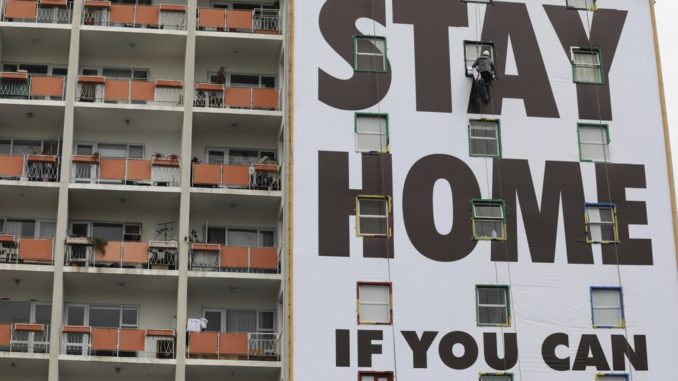

HARARE, Zimbabwe (AP) — Zimbabwe’s public hospital doctors and nurses went on strike Wednesday over a lack of protective gear as the coronavirus begins to spread in a country whose health system has almost collapsed. It’s the latest blow to a system where some patients’ families are asked to provide such basics as gloves and clean water.
“Right now we are exposed and no one seems to care,” said the Zimbabwe Hospital Doctors Association president, Tawanda Zvakada. Enock Dongo, president of the Zimbabwe Nurses Association, confirmed nurses’ participation. Zimbabwe has three cases of COVID-19 and recorded its first death this week.
Neighboring South Africa’s coronavirus cases jumped to 709, its health minister said, as the country with Africa’s most cases prepared to go into lockdown Friday.
South Africa’s police minister, Bheki Cele, said two people with the coronavirus have been charged with attempted murder because they didn’t obey orders to isolate themselves.
Cases across Africa are now well above 2,400. With Mali, Libya and Guinea-Bissau announcing their first, 46 of the continent’s 54 countries have the virus.
In western Kenya, riot police fired tear gas after traders resisted police attempts to close a crowded market in Kisumu to help curb the virus’ spread. The country has 25 cases and on Wednesday imposed a curfew, as did South Sudan.
“Our government keeps telling us to stay indoors yet we don’t have money to eat,” said one trader in Kisumu, Joash Okoth Abute. “There are only a few people with money and many without money, so I am pleading with the government to ensure all Kenyans are secure. Help us.”
As cases rose to 68 in Ghana, some people debated imposing a lockdown. “What are we going to eat?” asked Ali Seidu, a driver in the capital, Accra. Civil servant Abraham Ofei disagreed: “If they do not do it early, by the time they decide it will be too late.”
Some African leaders scolded citizens for not adhering to prevention measures.
“Countrymen and women, I have gone ’round the city and I have seen for myself that many among us are not taking this COVID-19 seriously,” Zambian President Edgar Lungu said in Lusaka. “I have seen multitudes patronizing bars or freely hugging and shaking hands at funerals, contrary to health advice.” The country has 12 cases.
Congo became the latest to close its borders while reporting its third death. The sprawling nation has one of Africa’s weakest health systems and has been battling another global health emergency, an Ebola virus outbreak. While that could be within days of being declared over, Congo also faces a large measles outbreak.
In Uganda, an eight-month-old baby was among the latest cases.
As more African countries impose restrictions on gatherings and travel, many informal workers suffer. Ethiopia’s government in a proposal to the Group of 20 major industrialized nations has said Africa needs a $150 billion emergency financing package because “COVID-19 poses an existential threat to the economies of African countries.”
South Africa has an unemployment rate of 29% and the lockdown will hit workers hard. But authorities fear what will happen if the virus sweeps through crowded low-income communities and public transport.
Teeming prisons are another worry across Africa. Ethiopia’s state broadcaster EBC cited the attorney general as saying more than 4,000 prisoners with minor offenses or children will be released.
African countries that have not recorded cases are Sierra Leone, South Sudan, Burundi, Malawi, Botswana, Comoros, Lesotho and Sao Tome and Principe, according to the Africa Centers for Disease Control and Prevention. Some have the most fragile health systems on the continent.
For most people, the new coronavirus causes mild or moderate symptoms, such as fever and cough that clear up in two to three weeks. For some, especially older adults and people with existing health problems, it can cause more severe illness, including pneumonia and death.
___
Francis Kokutse in Accra, Ghana; Baba Ahmed in Bamako, Mali; Elias Meseret in Addis Ababa, Ethiopia and Noel Sichalwe in Lusaka, Zambia contributed.
https://apnews.com/937514cb5d11e0237c909e9c0c0997ad

Be the first to comment